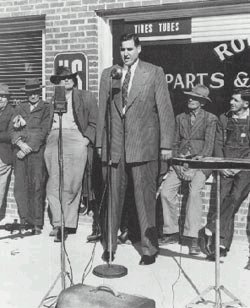One That Will Raise Some Hackles
 The difference between active righteousness and passive righteousness is the difference between asserting oneself and having oneself emptied. There is really only one right answer in a Christian sense between these two.
The difference between active righteousness and passive righteousness is the difference between asserting oneself and having oneself emptied. There is really only one right answer in a Christian sense between these two."… it shows us clearly that real sin does not consist in individual transgressions of the law at all, but in the basic attitude of man – his striving to establish his own righteousness, and to glorify himself in the presence of God. But this is sin because such a delusion does violence to God’s honor, and does not acknowledge that man can live only by the grace of God." (Rudolf Bultmann Christ the End of the Law)
Since the whole of Rudolf Bultmann’s work gets shoved aside by the typical evangelical for issues unrelated to the topic he is addressing above, it is necessary to explore this further. The striving of one’s all for God has some unintended consequences. One’s all encompasses one’s own open rebellion against God. It is seen with the elder brother of Luke 15 and Friedrich Nietzsche sees it plainly in his advice to “will to power.”
"Man must incorporate his devil or, as he [Nietzsche] put it, man must become better and more evil; the tree that would grow taller must send its roots down deeper." (Irrational Man by William Barrett)
In other words, asserting oneself in any way (including synergistically working toward holiness) incorporates the very devil of human nature. It may not be sexual sin, heroin addiction, or any other “prodigal” sin that a typical Christian might define as the essence of sin. This “elder brother” sin is much more subtle and more difficult to detect in Christian circles. It manifests itself in clean-cut suburbia, Republican sensibilities, and sexual propriety. It looks like old-fashioned American know-how, but it disguises the ultimate condition of sin seen in the Garden. It is the sin of overthrowing God to create one’s own righteousness or power without Him.





